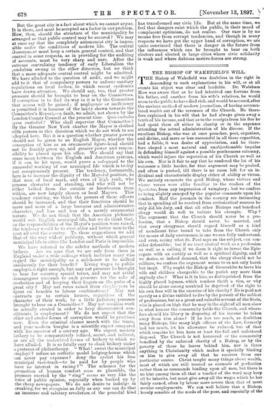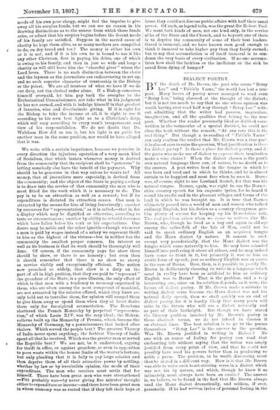THE BISHOP OF WAKEFIELD'S WILL. T HE Bishop of Wakefield was
doubtless in the right in descending to such explanations in his will, or at all events his object was clear and laudable. Dr. Walsham
How was aware that as he had inherited one fortune from his father, and another from his wife's relatives, he would
seem to the public to have died rich, and would be accused, after the envious method of modern journalism, of having accumu-
lated wealth out of the revenues of the Church. He there-
fore explained in his will that he had always given away a tenth of his income, and that as to the receipts from his See he
had spent them all either in charity or in the expenses attending the actual administration of his diocese. If the excellent Bishop, who was at once preacher, poet, organiser, and divine, and more or less successful in all these capacities, had a foible, it was desire of appreciation, and he there- fore obeyed a most natural and unobjectionable impulse in defending himself against a possible posthumous calumny, which would injure the reputation of his Church as well as his own. Nor is it fair to say that he rendered the lot of his successor a little harder, for that argument may be pushed, and often is pushed, till there is no room left for an in- dividual and characteristic display either of ability or virtue.
We entirely exonerate the good Bishop, whose virtues and whose verses were alike familiar to the readers of the Spectator, from any imputation of vainglory; but we confess to being slightly annoyed by the popular comments upon his conduct. Half the journals in the country are intimating that in spending all he received from ecclesiastical sources he only did his duty, and that all other Bishops and beneficed clergy would do well to imitate his example. Why ? The argument that the Church should never be a pro- fession, that a Bishop should never be married, and that every clergyman should regard himself as a kind of mendicant friar bound to take from the Church only the means of daily sustenance, is one we can fully understand, and even, seeing what St. Paul says on the subject, can con- sider defensible ; but if we treat clerical work as a profession
as well as a calling, if we deem it right to invest the Epis- copate with an earthly as well as a spiritual dignity, and if we desire, or indeed demand, that the clergy should not be
celibate, we confess the argument seems to us not only harsh but inept. Why ought the Bishop of Greenshire to leave his wife and children chargeable to the parish any more than anybody else ? What is it in him, as distinguished from the highly placed layman, which renders thrift a vice, or why should he alone among mankind be deprived of the right to his own free will in the exercise of his charity? He is paid not merely as a divine entitled to live by the pursuit of the noblest of professions, but as a great and valuable servant of the State, who is placed on high that he may in the sight of all men show in what honour the community holds the Church, and where- fore should his liberty in disposing of his income be taken away from him alone ? If he has too much, as doubtless many Bishops, like many high officers of the Law, formerly had too much, let his allowance be reduced, but of that which remains let him have at least the full and unfettered disposal. The Church is not honoured or the community benefited by the enforced charity of a Bishop, or by the
poverty of those he leaves behind him, nor is there anything in Christianity which makes it specially binding on him to give away all that he receives from one particular source. Christ taught many things about wealth, most of which are still treated as counsels of perfection rather than as commands binding upon all men, but there is no hint among them all that a teacher of the word may keep all he inherits, but must give away all the wages which he has fairly earned, often by labour more severe than that of most secular employments. We can well believe that a Bishop, keenly sensible of the needs of the poor, and especially of the needs of his own poor clergy, might feel the impulse to give away all his surplus funds, but we can see no reason in his drawing distinctions as to the source from which those funds arise, or admit that his surplus begins before the decent needs of his family are satisfied. Suppose in the sacred cause of charity he kept them alive, as so many mothers are compelled to do, on dry bread and tea ? The money is either his own or it is not, and if it is his own he is bound to use it like any other Christian, first in paying his debts, one of which is owing to his family, and then in just so wide and large a charity as will still leave him the "cheerful giver" whom the Lord loves. There is no such distinction between the cleric and the layman as the journalists are endeavouring to set up, and no such superior character of trusteeship in the Bishop or the priest. We are all trustees of what we have if we do our duty, not the clerical order alone. If a Bishop conceives himself overpaid, let him pay back the overplus to the Ecclesiastical Commissioners, not take what in his judgment he has not earned, and with it indulge himself in that greatest af luxuries, wise and discriminate giving. If it is right for the Bishop to take the income at all, it is right to use it according to his own best light as to a Christian's duty, which will vary according to every man's temperament and view of his responsibilities. We do not doubt that Dr. Walsham How did so use it, but his light is no guide for another man in the same position, nor would he have alleged that it was.
We write with a certain impatience, because we perceive in every direction the injurious operation of a very mean kind of Socialism, that which insists whenever money is derived from the community that its recipient shall be " generous " in letting somebody else have the benefit of the payment. Why should he be generous in that way unless he wants to ? All money, that of journalists more especially, is derived from the community; and the object of the State in paying a salary is to draw into the service of that community the man who is most fitted for the work which it is necessary to do. The pay is to be an attraction as well as a reward; but if its expenditure is dictated its attraction ceases. One man is attracted by the means for him of living luxuriously ; another by resources for "representation," as it is called,—that is, for a display which may be dignified or otherwise, according to taste or circumstances ; another by ability to rebuild fortunes which have fallen below his rank or his expectations. One desire may be noble and the other ignoble—though whenever a man is paid by wages instead of a salary we represent thrift to him as the highest of the virtues—but in neither has the community the smallest proper concern. Its interest as well as its business is that its work should be thoroughly well done. Of course, if the community pays for show there should be show, or there is no honesty ; but even then it should remember that there is no show so showy as service visibly and exceptionally efficient. The notion now preached so widely, that show is a duty on the part of all in high position, that they are paid to " represent " the grandeur of the State, is a pure illusion, the only effect of which is that men with a tendency to economy engrained in them, who are often among the most competent of mankind, are not attracted by the salaries offered, which they know are only held out to tantalise them, for opinion will compel them to give them away or spend them when they at heart desire them only for far-sighted accumulation. The Bourbons shattered the French Monarchy by perpetual "representa- tion," of which Louis XIV. was the very ideal; the Hohen- zollerns built up the Monarchy of Prussia, which became the Monarchy of Germany, by a penuriousness that looked after thalers. Which served the people best ? The greatest Viceroy of India never spent anything ; the feeblest Viceroy of India spent all that he received. Which was the greater man or served
• the Republic best ? We are not, be it understood, arguing for thrift in office, or against grandeur, or even in opposition to pure waste within the honest limits of the waster's fortune, but only pleading that it is folly to pay large salaries and then deprive them of all their attractive power by settling, I whether by law or by irresistible opinion, the mode of their ! expenditure. The man who receives must settle that for himself. There have been great men who were strengthened probably was—by never giving five minutes' thought either to expenditure or income—and there have been great men in whom economy was so rooted that if they left their keys at ,
home they could not discuss public affairs with half their usual power. Of such, as legend tells, was the great Sir Robert Peel. We want both kinds of men, not one kind only, in the service alike of the State and the Church, and to boycott one of them is to deprive the community of some of their best leaders. Greed is immoral, and we have known men good enough to think it immoral to take higher pay than they fairly earned; but to say that accumulation is of itself immoral is to con- demn the very basis of every civilisation. If no one accumu- lates how shall the luckless or the inefficient or the sick be saved from dying of hunger?







































 Previous page
Previous page